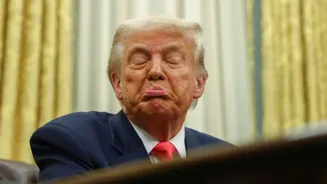What is the story about?
Jeffrey A Sonnenfeld, Lester Crown Professor at Yale School of Management, stated in a recent analysis titled 'Trump's Tariffs are Hobbling the US Economy' described how the Trump tariffs have fundamentally disrupted markets, leaving US businesses vulnerable to the double threat of uncertainty and cost inflation. In his analysis, which was published in 'Yale Insights', he asserted that 'over time, more businesses and consumers will start to realise how much better off they would be without the tariffs'.
The United States has historically championed free trade, particularly after World War II. It played a key role in establishing the General Agreement on Tariffs and Trade (GATT) and later the World Trade Organisation (WTO), both promoting reduced trade barriers. While the US has negotiated numerous free trade agreements, its commitment to free trade has recently been a topic of debate, especially with the rise of protectionist sentiment.
Several Republican US presidents have voiced support for free trade. Ronald Reagan famously championed free trade, stating, "The freer the flow of world trade, the stronger the tides of human progress and peace among nations." George H W Bush and George W Bush also supported free trade and emphasised its benefits for North America. However, Donald Trump has adopted a more protectionist stance, criticising trade deals like the North American Free Trade Agreement (NAFTA) and imposing tariffs on goods from various countries.
President Trump's tariffs, while intended to boost domestic production and jobs, are having a complex set of global and domestic economic effects. While the tariffs are designed to protect specific domestic industries and raise revenue, the overall economic impact on the US and the global economy is turning out to be negative, resulting in reduced trade, higher costs, and decreased growth.
The tariffs are sparking intense uncertainty in the US, and it's unclear how it will all end. The full impact of these tariffs is still unfolding, and economic projections may vary depending on how consumers, businesses, and governments respond. The implementation of Trump's tariffs could significantly impact economic growth within the US.
The New York Times (August 20) carries a report, 'American Businesses in Survival Mode as Trump Tariffs Pile Up', which mentions that small businesses are the backbone of the country, yet these tariffs unfairly target them. Small business owners are facing the reality that they may have to shut down and have urged the President to reconsider the tariffs so that they can continue contributing to the economy without being crushed by costs beyond their control. The owner of a small business is quoted in the report as saying that 'This seems like a problem too large to solve,' adding, 'It has completely wrecked my mental health.'
Economists fear that the tariffs risk a steady erosion of the US economy and predict a potential reduction of the US GDP in the long run. Higher prices of imported goods can translate to increased costs for consumers, reducing their purchasing power and potentially lowering their real wages. US consumers are beginning to feel the impact of Trump's tariffs as businesses pass on the higher costs to them. Everyday goods and services are becoming more expensive and will continue doing so during the coming months.
Tariffs are also causing significant disruptions to the supply chains of US businesses, affecting various sectors and creating several challenges. Such disruptions to supply chains also lead to increased costs, particularly for small and medium-sized enterprises. Small businesses may face challenges in coping with unexpected costs and risks associated with tariffs, potentially impacting hiring and investment decisions also.
The tariffs have negatively impacted the US labour market, potentially leading to job losses and difficulty in finding new employment. In July 2025, the US economy added 73,000 jobs, according to the US Bureau of Labour Statistics. This figure is significantly lower than expected and represents a sharp slowdown in job growth compared to previous months. The unemployment rate edged up to 4.2 per cent.
There's ongoing uncertainty about the legal basis of these tariffs, particularly regarding the administration's reliance on the International Emergency Economic Powers Act (IEEPA), which could be challenged in court. Against this background, it is not surprising that multiple cases have been filed in the US Federal Courts against the Trump Administration's tariffs. These pose serious legal challenges and test the limits of presidential power in imposing such measures.
The main legal challenge centres on whether the IEEPA gives the President authority to impose tariffs without specific congressional approval. While the IEEPA grants the President broad economic action powers during national emergencies, it does not explicitly mention tariffs. Challengers argue that tariffs are a matter for Congress to decide, while the administration contends IEEPA's powers include imposing tariffs. Other arguments concern whether the reasons for the tariffs qualify as an "unusual and extraordinary threat" under IEEPA and broader constitutional limits on executive power.
One important case is VOS Selections Inc v Trump:This case, consolidated with lawsuits from several states, was heard by the US Court of International Trade (CIT). The Court of International Trade ruled in May that the tariffs, issued under the International Emergency Economic Powers Act (IEEPA), were unlawful because they did not have a rational connection to the national emergencies declared by President Trump.
Another important case is Learning Resources, Inc v Trump. In this case, the District of Columbia District Court went even further and gave a ruling that the IEEPA doesn't authorise tariffs at all.
Several other federal lawsuits are pending, challenging the tariffs based on similar arguments regarding IEEPA and the president's authority to impose tariffs without congressional approval.
Both the Court of International Trade and DC District Court rulings have been stayed, or paused, by the Federal Circuit Court after appeals by the Trump administration. Given the constitutional significance of the cases, it is widely expected that the losing party at the Federal Circuit will appeal to the Supreme Court. For now, importers must continue paying the tariffs, as the lower court rulings striking them down have been stayed during the appeals process. If the courts ultimately rule against Trump, importers may be eligible for refunds of tariffs already paid. However, this process could be lengthy.
The current emphasis on tariffs under the Trump administration is significantly impacting the future of US foreign policy by reshaping trade relationships, altering the dynamics of global alliances, and influencing the approach to international cooperation.The US is unlikely to fully revert to its previous, more open trading system in the near future, partly due to the substantial revenue generated by the tariffs. President Donald Trump has said that his tariffs are taking in “trillions of dollars”, but according to
Forbes, his levies have generated only about $96 billion in revenue since taking effect in April.
There are also fears that Trump's tariffs could lead to a "domino effect", with other countries raising their own trade barriers. The continued use of tariffs is expected to create instability and uncertainty in the global trade landscape, with potential negative consequences for businesses and consumers worldwide. The long-term effects on global alliances, supply chains, and the development of new trade agreements remain to be seen, but the current policies represent a significant shift away from the traditional rules-based multilateral trading system. Countries might reduce exports to the US and seek other markets, with unpredictable consequences globally.
Thus, the tariffs will have widespread global economic implications. Retaliatory tariffs from other countries could affect US exports, potentially further impacting the US. Countries reliant on the US market could experience slower economic growth due to the tariffs, as exemplified by Germany's industrial production decline.
India-US trade relations have soured with Trump imposing a 25 per cent blanket tariff on Indian exports and topping those with an additional 25 per cent in duties—expected to come into effect on Aug. 27—as a “penalty” for India purchasing Russian crude. India has said it was being targeted unfairly while calling out the EU and the US on their continuing trade with Russia. “It is revealing that the very nations criticising India are themselves indulging in trade with Russia," India has said.
If it comes into effect, Trump’s cumulative 50 per cent tariff rate on India would be among the highest on any of the US′s trading partners. Just a few months ago, the Trump administration seemed intent on continuing the bipartisan effort to deepen ties with India as a geopolitical counterweight to China, but the tariffs are a complete turnaround from that. Rather than just a tool of economic coercion, Trump is instead wielding tariffs as a political weapon. The president’s top trade adviser, Peter Navarro, even has a new term for these explicitly political trade threats:
“national security tariffs”.
After his meeting with Putin in Alaska, Donald Trump said that he may have to rethink retaliatory tariffs on countries buying Russian oil in two to three weeks but doesn't have to do so right now. He said that this was because of what happened at the meeting. This may be a welcome development, but it remains to be seen how things are going to unfold and how India's relations with the US will shape up in the emerging scenario.
The United States has paused trade negotiations with India. The scheduled visit by US trade representatives to New Delhi later on August 25-29 has been called off, and a new schedule for talks has not been finalised. This move by the US may appear to be surprising, as India was one of the first countries to start trade negotiations with Washington.
However, a deadlock has resulted as India has been reluctant to cave in to US demands to open up its dairy and agriculture markets. In his speech on India's Independence Day, Indian Prime Minister Narendra Modi did not directly refer to the trade tensions with Washington but said he had "stood as a wall for the farmers and livestock keepers against any detrimental policy, protecting their rights and livelihoods".
According to an analysis by the Indian Council for Research on International Economic Relations (ICRIER), an economic policy think tank, around 70 per cent of India's goods exports to the US, valued at $60.85 billion, are now exposed to the 50 per cent tariff imposed by the US administration. The impact of these tariffs is particularly concentrated in labour-intensive and high-value sectors, including textiles and apparel, gems and jewellery, auto parts and agricultural products, with shrimp exports being particularly vulnerable. These tariffs have also raised concerns about their potential impact on India's export competitiveness, especially when compared to rivals like Bangladesh, Pakistan, and Vietnam, who face lower tariffs on similar products exported to the US.
Summing up, the long-term effects of these tariffs are still evolving, and the broader economic impact may continue to unfold over time. There is no denying that Trump's tariffs are having a direct economic impact on Americans and causing uncertainty in the domestic environment.
Businesses are facing complexities in navigating tariffs and potential disruptions to global supply chains. Trump's tariffs are also likely to have a net negative impact on global trade and economic growth, although the magnitude and specific effects will depend on the evolution of trade policies and the responses of various countries.
Other countries are considering liberalising trade among themselves to a greater extent. Trade among them could increase at a greater rate than would have been the case had Trump not imposed the new tariffs. The harm done to America’s credibility and its relations with international partners could be costly over the long run. Over time, more US businesses and consumers will start to realise how much better off they would be without the tariffs.
The writer is a retired Indian diplomat and had previously served as Ambassador in Kuwait and Morocco and as Consul General in New York. Views expressed in the above piece are personal and solely those of the author. They do not necessarily reflect Firstpost’s views.
The United States has historically championed free trade, particularly after World War II. It played a key role in establishing the General Agreement on Tariffs and Trade (GATT) and later the World Trade Organisation (WTO), both promoting reduced trade barriers. While the US has negotiated numerous free trade agreements, its commitment to free trade has recently been a topic of debate, especially with the rise of protectionist sentiment.
Several Republican US presidents have voiced support for free trade. Ronald Reagan famously championed free trade, stating, "The freer the flow of world trade, the stronger the tides of human progress and peace among nations." George H W Bush and George W Bush also supported free trade and emphasised its benefits for North America. However, Donald Trump has adopted a more protectionist stance, criticising trade deals like the North American Free Trade Agreement (NAFTA) and imposing tariffs on goods from various countries.
President Trump's tariffs, while intended to boost domestic production and jobs, are having a complex set of global and domestic economic effects. While the tariffs are designed to protect specific domestic industries and raise revenue, the overall economic impact on the US and the global economy is turning out to be negative, resulting in reduced trade, higher costs, and decreased growth.
The tariffs are sparking intense uncertainty in the US, and it's unclear how it will all end. The full impact of these tariffs is still unfolding, and economic projections may vary depending on how consumers, businesses, and governments respond. The implementation of Trump's tariffs could significantly impact economic growth within the US.
The New York Times (August 20) carries a report, 'American Businesses in Survival Mode as Trump Tariffs Pile Up', which mentions that small businesses are the backbone of the country, yet these tariffs unfairly target them. Small business owners are facing the reality that they may have to shut down and have urged the President to reconsider the tariffs so that they can continue contributing to the economy without being crushed by costs beyond their control. The owner of a small business is quoted in the report as saying that 'This seems like a problem too large to solve,' adding, 'It has completely wrecked my mental health.'
Economists fear that the tariffs risk a steady erosion of the US economy and predict a potential reduction of the US GDP in the long run. Higher prices of imported goods can translate to increased costs for consumers, reducing their purchasing power and potentially lowering their real wages. US consumers are beginning to feel the impact of Trump's tariffs as businesses pass on the higher costs to them. Everyday goods and services are becoming more expensive and will continue doing so during the coming months.
Tariffs are also causing significant disruptions to the supply chains of US businesses, affecting various sectors and creating several challenges. Such disruptions to supply chains also lead to increased costs, particularly for small and medium-sized enterprises. Small businesses may face challenges in coping with unexpected costs and risks associated with tariffs, potentially impacting hiring and investment decisions also.
The tariffs have negatively impacted the US labour market, potentially leading to job losses and difficulty in finding new employment. In July 2025, the US economy added 73,000 jobs, according to the US Bureau of Labour Statistics. This figure is significantly lower than expected and represents a sharp slowdown in job growth compared to previous months. The unemployment rate edged up to 4.2 per cent.
There's ongoing uncertainty about the legal basis of these tariffs, particularly regarding the administration's reliance on the International Emergency Economic Powers Act (IEEPA), which could be challenged in court. Against this background, it is not surprising that multiple cases have been filed in the US Federal Courts against the Trump Administration's tariffs. These pose serious legal challenges and test the limits of presidential power in imposing such measures.
The main legal challenge centres on whether the IEEPA gives the President authority to impose tariffs without specific congressional approval. While the IEEPA grants the President broad economic action powers during national emergencies, it does not explicitly mention tariffs. Challengers argue that tariffs are a matter for Congress to decide, while the administration contends IEEPA's powers include imposing tariffs. Other arguments concern whether the reasons for the tariffs qualify as an "unusual and extraordinary threat" under IEEPA and broader constitutional limits on executive power.
One important case is VOS Selections Inc v Trump:This case, consolidated with lawsuits from several states, was heard by the US Court of International Trade (CIT). The Court of International Trade ruled in May that the tariffs, issued under the International Emergency Economic Powers Act (IEEPA), were unlawful because they did not have a rational connection to the national emergencies declared by President Trump.
Another important case is Learning Resources, Inc v Trump. In this case, the District of Columbia District Court went even further and gave a ruling that the IEEPA doesn't authorise tariffs at all.
Several other federal lawsuits are pending, challenging the tariffs based on similar arguments regarding IEEPA and the president's authority to impose tariffs without congressional approval.
Both the Court of International Trade and DC District Court rulings have been stayed, or paused, by the Federal Circuit Court after appeals by the Trump administration. Given the constitutional significance of the cases, it is widely expected that the losing party at the Federal Circuit will appeal to the Supreme Court. For now, importers must continue paying the tariffs, as the lower court rulings striking them down have been stayed during the appeals process. If the courts ultimately rule against Trump, importers may be eligible for refunds of tariffs already paid. However, this process could be lengthy.
The current emphasis on tariffs under the Trump administration is significantly impacting the future of US foreign policy by reshaping trade relationships, altering the dynamics of global alliances, and influencing the approach to international cooperation.The US is unlikely to fully revert to its previous, more open trading system in the near future, partly due to the substantial revenue generated by the tariffs. President Donald Trump has said that his tariffs are taking in “trillions of dollars”, but according to
There are also fears that Trump's tariffs could lead to a "domino effect", with other countries raising their own trade barriers. The continued use of tariffs is expected to create instability and uncertainty in the global trade landscape, with potential negative consequences for businesses and consumers worldwide. The long-term effects on global alliances, supply chains, and the development of new trade agreements remain to be seen, but the current policies represent a significant shift away from the traditional rules-based multilateral trading system. Countries might reduce exports to the US and seek other markets, with unpredictable consequences globally.
Thus, the tariffs will have widespread global economic implications. Retaliatory tariffs from other countries could affect US exports, potentially further impacting the US. Countries reliant on the US market could experience slower economic growth due to the tariffs, as exemplified by Germany's industrial production decline.
India-US trade relations have soured with Trump imposing a 25 per cent blanket tariff on Indian exports and topping those with an additional 25 per cent in duties—expected to come into effect on Aug. 27—as a “penalty” for India purchasing Russian crude. India has said it was being targeted unfairly while calling out the EU and the US on their continuing trade with Russia. “It is revealing that the very nations criticising India are themselves indulging in trade with Russia," India has said.
If it comes into effect, Trump’s cumulative 50 per cent tariff rate on India would be among the highest on any of the US′s trading partners. Just a few months ago, the Trump administration seemed intent on continuing the bipartisan effort to deepen ties with India as a geopolitical counterweight to China, but the tariffs are a complete turnaround from that. Rather than just a tool of economic coercion, Trump is instead wielding tariffs as a political weapon. The president’s top trade adviser, Peter Navarro, even has a new term for these explicitly political trade threats:
After his meeting with Putin in Alaska, Donald Trump said that he may have to rethink retaliatory tariffs on countries buying Russian oil in two to three weeks but doesn't have to do so right now. He said that this was because of what happened at the meeting. This may be a welcome development, but it remains to be seen how things are going to unfold and how India's relations with the US will shape up in the emerging scenario.
The United States has paused trade negotiations with India. The scheduled visit by US trade representatives to New Delhi later on August 25-29 has been called off, and a new schedule for talks has not been finalised. This move by the US may appear to be surprising, as India was one of the first countries to start trade negotiations with Washington.
However, a deadlock has resulted as India has been reluctant to cave in to US demands to open up its dairy and agriculture markets. In his speech on India's Independence Day, Indian Prime Minister Narendra Modi did not directly refer to the trade tensions with Washington but said he had "stood as a wall for the farmers and livestock keepers against any detrimental policy, protecting their rights and livelihoods".
According to an analysis by the Indian Council for Research on International Economic Relations (ICRIER), an economic policy think tank, around 70 per cent of India's goods exports to the US, valued at $60.85 billion, are now exposed to the 50 per cent tariff imposed by the US administration. The impact of these tariffs is particularly concentrated in labour-intensive and high-value sectors, including textiles and apparel, gems and jewellery, auto parts and agricultural products, with shrimp exports being particularly vulnerable. These tariffs have also raised concerns about their potential impact on India's export competitiveness, especially when compared to rivals like Bangladesh, Pakistan, and Vietnam, who face lower tariffs on similar products exported to the US.
Summing up, the long-term effects of these tariffs are still evolving, and the broader economic impact may continue to unfold over time. There is no denying that Trump's tariffs are having a direct economic impact on Americans and causing uncertainty in the domestic environment.
Businesses are facing complexities in navigating tariffs and potential disruptions to global supply chains. Trump's tariffs are also likely to have a net negative impact on global trade and economic growth, although the magnitude and specific effects will depend on the evolution of trade policies and the responses of various countries.
Other countries are considering liberalising trade among themselves to a greater extent. Trade among them could increase at a greater rate than would have been the case had Trump not imposed the new tariffs. The harm done to America’s credibility and its relations with international partners could be costly over the long run. Over time, more US businesses and consumers will start to realise how much better off they would be without the tariffs.
The writer is a retired Indian diplomat and had previously served as Ambassador in Kuwait and Morocco and as Consul General in New York. Views expressed in the above piece are personal and solely those of the author. They do not necessarily reflect Firstpost’s views.





















